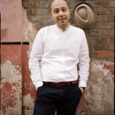Rayfield Allied is delighted to announce that Mahan Esfahani has signed to Deutsche Grammophon.
PRESS RELEASE: 1 August 2014, Bristol:
Harpsichordist Mahan Esfahani – whose “daring and fiery performances” (The Times) have made him “his instrument’s leading champion” (International Piano) – today signed an exclusive contract with Deutsche Grammophon, prior to his debut at the Bristol Proms. His first recording for the Yellow Label – an eclectic programme fusing Baroque with Minimalism – will be released next year, making it the first harpsichord album to come out of the label in over 30 years.
Welcoming Mahan Esfahani to the Yellow Label’s roster of artists, Deutsche Grammophon President Mark Wilkinson said: “Mahan is a dynamic, daring musician who thinks way beyond the conventional boundaries of his instrument, and is well placed to add excitement to and find new audiences for the harpsichord.”
“I am proud to become part of the Deutsche Grammophon family,” said Esfahani, “As a musician I like to think out of the box, and here is a label with the same attitude. I am particularly proud to be joining the label of one of my great idols, the harpsichord legend Ralph Kirkpatrick. I am honoured to be in such company.”
Mahan Esfahani was born in Tehran in 1984 and studied piano with his father before moving on to harpsichord and organ. He was the first harpsichordist to be named a BBC “New Generation Artist” and to be awarded a prize from the Borletti-Buitoni Trust. He made his Wigmore Hall solo debut in 2009 and developed an ever-growing reputation as a recitalist and concerto soloist at major European halls. In July 2011, he made history with the first solo harpsichord recital in the Proms, selling out London’s Cadogan Hall, and was reinvited to the Proms in 2012 to direct his own orchestration of JS Bach’s Art of Fugue for the Academy of Ancient Music. He has been nominated for Gramophone’s coveted “Artist of the Year” award 2014.
Refusing to be pigeon-holed, Esfahani is a tireless standard-bearer for the harpsichord and any music that it can tackle. “He sees the harpsichord as a contemporary instrument,” says arts commentator Norman Lebrecht, adding: “He’s had all the right authentic training, but he’s casting it off. He’s carving his own furrow into the world of the harpsichord.”
See the full press release here.

